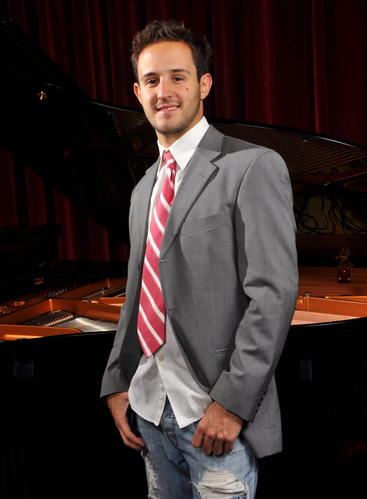Student Profile: Javier Samayoa

Javier Samayoa<br /><strong>Hometown:</strong> Guatemala City, Guatemala<br /><strong>Major:</strong> Music Business/Management, Performance<br /><strong>Instruments:</strong> Piano, Guitar
Photo by Phil Farnsworth
Berklee's educational opportunities can go way beyond the classroom. For Javier Samayoa, they stretched to Miami, Mexico, and beyond. From the germ of an idea, he and his friend Daniel Diaz built strong new relationships between Berklee and the crema of the Latin music business world—including Gloria and Emilio Estefan, producers/engineers Benny Faccone '78 and Sebastian Krys, Ricky Martin, and Aleks Syntek.
Along with hosting a show on the BIRN, Samayoa has worked for the Latin Grammys, the MTV Latin Awards, and the college's Office of Public Information. He's organizing the Berklee Canta en Español singer/songwriter contest, which will be broadcast in 60 countries. After graduation, he plans to jet between L.A. and Mexico City. We talked to him about how he's come this far; here is a condensed and edited sample of the conversation.
How did you get started in the Latin music business world?
I was with my roommate Daniel Diaz in the gym. He told me, "Hey, I've got this idea about going to the Latin Grammys and establishing this new connection with the Latin community and Berklee." I told him, "Let's do it." I had no idea what I was doing! We approached [music business/management professor] Peter Alhadeff and he became our advisor. We started bringing a lot of people to the school for panels. We just got really excited.
How did you put together the Berklee panel and showcase at the Latin Billboard awards?
It started as a small project—we would take 10, 15 people.
That doesn't sound like a small project.
Maybe we were just being naive! We got in touch with publishing companies, labels, the Hit Factory studio—we had everything lined up. Billboard gave us tickets for $250 and they were originally like $700 each. We ended up taking 35 people.
Any near-disasters?
We've had wild, wild experiences. With different panels—I'm not going to mention any names—we've had some people that have stood us up. For the Billboard showcase, we had everything lined up when we were contacted by Billboard saying we had to move that event because it was competing with theirs. We want to have good relationships with them, so we moved it. It was a complete mess. We found out later that rescheduling reinforced our relationship with Billboard and even impressed them.
What role did Berklee play in supporting these activities?
The moral and the financial support—that's the backbone, because all of these projects need money. We would go to different offices for different projects because we understand that there's limited funding. The good thing with that is that you're making relationships within Berklee. It builds word of mouth. It's really important to have internal communication.
How have you seen the Latin music community develop here?
I'm excited that it's been growing. People from different countries, they bring in different things from their own background.
What's next for you?
I'm not completely sure. I'm thinking it will mostly be involved in live events and the television business. I've worked so hard to understand a lot of different parts of the business. That's opened a lot of doors to me. I've really worked in diversification—never putting all of my eggs into one basket.
How about your own music?
Unfortunately I've had to sacrifice some time for my playing and my songwriting. But I'm catching up. A dream of mine is to be a singer/songwriter. That's a big part of the reason, actually, that we've been motivated to go out there and meet these people—so that once we go into the industry, they can ask us, "Do you do music? Show it to me," instead of us pushing it down their throats.
What advice do you have for Berklee students?
Keep the passion in the things you do, but never forget there's always a necessity to know how to sell that passion, how to sell the work you do. Because if not, you'll just be like a sail with no wind.
Top Five Latin Artists Everyone Should Hear
- Maná
- Juan Luis Guerra
- Ricardo Arjona
- Nek
- Soda Stereo
